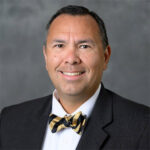Why Expectations Impact Leadership Development
Do you think a leader should be a hero, out in front leading people? Or behind the scenes, coordinating the team’s work? Are some people destined to become leaders, or can leadership skills be developed? Are leaders born or made?
The way we think about leadership affects how we perceive the leaders around us. If we expect a leader to be a hero, we’re likely to see someone who takes charge to save the day as having the characteristics of a good leader. With that same expectation, someone who seeks everyone’s opinion and lets the team shape decisions may be seen as weak.
Alternatively, if we think a leader should be collaborative and focused on making sure decisions arise from the team, we would view someone who’s directive as aggressive or a tyrant.
In the same way, our beliefs about how people become leaders affect how we evaluate people’s leadership potential.
Believing leaders are born, not made, is likely to result in a focus more on selection (identifying the “right” people) rather than on development (developing the people you have). On the other hand, believing that people are made into leaders by their experiences would be more likely to result in a greater focus on making sure people had the right opportunities to develop into leaders.
This leads us back to the central question: Are leaders born or made?
At CCL, we believe everyone is born with the potential to be a leader — and that potential must be developed beyond skills. Developing the whole person — building capacity and instilling new mindsets through vertical development — is needed to expand potential.
The implication is that leaders are made because leadership can be practiced and learned. That’s the underlying belief that led our researchers to first document that experience is the best teacher for leaders. They introduced the 70-20-10 rule, outlining the 3 types of experiences that leaders learn and grow from, following a ratio of:
- 70% challenging experiences and assignments
- 20% developmental relationships
- 10% coursework and training
With this in mind, organizations, trainers, and even educators should create a learning environment where developmental opportunities are provided to allow individuals to see how leadership works and to grow as leaders through experience and training, in order to fully realize their leadership potential.
Let’s expand potential together.
Read our brand story to learn how we expand human potential for all people — from CEOs and first-time managers to every leader in between.
What Do Leaders in Your Organization Believe?
Understanding whether people in your organization think leaders are born or made is critical, because these attitudes play out in recruiting, promotion, and development decisions.
Will your organization spend resources on finding people believed to be natural-born leaders, or on developing people into becoming leaders? Will executives emphasize the selection of talent and only invest in those who they believe have leadership potential? Or will they see value in developing the leadership potential of everyone?
How senior executives answer the question of are leaders born or made may influence the entire culture of your organization and the way talent is developed.
If your CEO or executive team believes that leaders are born not made, they may focus more on selection. Organizational development may tend to have early identification programs for high potentials, in combination with on-the-job stretch assignments to develop certain leaders.
On the other hand, if your CEO or executive team believes that leaders are made not born, a broad-based leadership development strategy may be well received, and expected, by leaders up and down the organization.
Top leaders set the tone for the development of others within their organization, so understanding their views can inform talent identification and development strategies.
Development Is Important, Regardless of Whether Leaders Are Born or Made
Our research team explored this issue a few years ago, asking 361 C-level executives, “Are leaders born or made?” We found that their views were decidedly mixed:
- 52% believed that leaders are more made
- 19% believed that leaders are more born
- 29% believed that leaders are about equally born and made
This distribution suggests that executives don’t agree on whether leaders are born or made. To understand how their beliefs may play out in organizations, we examined the groups at each end of the continuum — the “Born Believers” and the “Made Believers” — and how they think about what creates a leader.
Born Believers place more importance on leader traits than Made Believers do, and they think that traits are slightly more important than experiences. In contrast, Made Believers think that experiences are substantially more important than leader traits (though both agree that experience is important).
Our research indicates that there’s little difference in how Born Believers and Made Believers feel about the availability of learning opportunities within their organizations. Both groups strongly believe that their organizations value employee learning and development opportunities, and that learning and developmental resources are available to them.
Even when top executives believe that leaders are born not made, they also believe that learning from experience is important for development. The difference is focus. Born Believers are likely to think that organizations should be very selective in who gets developmental opportunities, offering them only to those the leaders believe are most likely to benefit from them.
Born Believers Think Leaders Are Born Not Made
There are several theories that Born Believers may use for support. The “great man theory,” popularized in the 19th century, and “trait theory” suggest that great leaders are born and will emerge when they encounter the appropriate situation. But trait theory can be superficial — the people who are born with certain leadership traits may later prove unable to handle leader requirements.
Scientific research has sought answers as well, examining the impact of genes on leadership by comparing identical twins to fraternal twins and identifying DNA markers. The research supports the idea that it’s the joint influences of both nature and nurture that play important roles. In fact, the data shows that environmental factors weigh heavier in influencing individuals’ leadership journeys.
Made Believers Think Leaders Are Made Not Born
Made Believers point to training, hard work, hardships, and personal experience — not genetics — as the reasons why outstanding leaders are developed. They generally believe that leadership is complex and formed significantly by an individual’s environment. (Even the studies of twins, for example, assumes each grew up in the exact same environment.) They also point to the many leaders who were born to parents who weren’t leaders. Again, it’s the environment and experiences that shaped their rise, not genetics.
Improving Your Leadership Pipeline
We believe that leaders are made, not born. And our research suggests that executives agree: People become leaders, in large part, due to experiences that help them learn how to lead.
Regardless of how you and your organization’s executives would answer the question “Are leaders born or made?” you can continue to improve your organization’s leadership strength by providing your team with access to transformational development experiences. In combination with other forms of support such as coaching, mentoring, and on-the-job learning, this creates the opportunity to build a pipeline of better leaders at your organization.
Whether development experiences boost natural abilities or create new leadership skills may be debated — but either way, the investment creates a ripple effect that reaches beyond individuals. Expanding individual leadership potential creates a healthier workplace, a stronger organization, and a better world.
Ready to Take the Next Step?
Get our latest research, tips, and insights on leadership by signing up for our newsletters.











